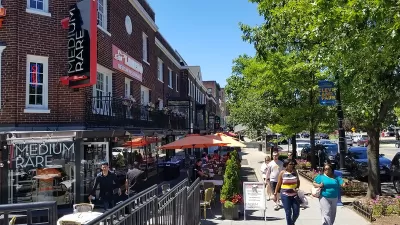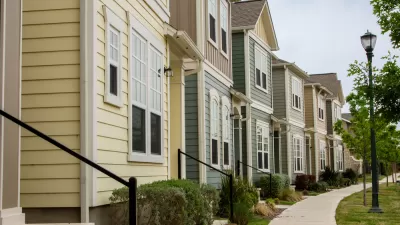In a move that will restrict the building envelope of residential properties, the Washington, D.C. Zoning Commission approved limitations to the construction of rear additions.
Michael Rouse reports on a change to the zoning code in Washington, D.C. that "makes it harder for homeowners to [build additional space] that by making it illegal to extend a house more than ten feet beyond its neighbor's back wall."
In addition to listing the benefits of extra space and dwelling units that rear additions afford, Rouse notes that a valid criticism of rear additions is their potential impact on neighboring properties. In response to those criticisms, the District's Zoning Commission has further restricted the development of rear additions.
Previously, the District's zoning code regulated rear additions on measurements of lot coverage and rear setbacks, so the new law amounts to a third qualifier. The rule goes into affect at the end of April, and Rouse's coverage provides a good primer for understanding the causes and effects of the change.
FULL STORY: You’ll have you jump through a new hoop if you want a rear addition on your house in DC

Planetizen Federal Action Tracker
A weekly monitor of how Trump’s orders and actions are impacting planners and planning in America.

Maui's Vacation Rental Debate Turns Ugly
Verbal attacks, misinformation campaigns and fistfights plague a high-stakes debate to convert thousands of vacation rentals into long-term housing.

San Francisco Suspends Traffic Calming Amidst Record Deaths
Citing “a challenging fiscal landscape,” the city will cease the program on the heels of 42 traffic deaths, including 24 pedestrians.

Defunct Pittsburgh Power Plant to Become Residential Tower
A decommissioned steam heat plant will be redeveloped into almost 100 affordable housing units.

Trump Prompts Restructuring of Transportation Research Board in “Unprecedented Overreach”
The TRB has eliminated more than half of its committees including those focused on climate, equity, and cities.

Amtrak Rolls Out New Orleans to Alabama “Mardi Gras” Train
The new service will operate morning and evening departures between Mobile and New Orleans.
Urban Design for Planners 1: Software Tools
This six-course series explores essential urban design concepts using open source software and equips planners with the tools they need to participate fully in the urban design process.
Planning for Universal Design
Learn the tools for implementing Universal Design in planning regulations.
Heyer Gruel & Associates PA
JM Goldson LLC
Custer County Colorado
City of Camden Redevelopment Agency
City of Astoria
Transportation Research & Education Center (TREC) at Portland State University
Jefferson Parish Government
Camden Redevelopment Agency
City of Claremont





























